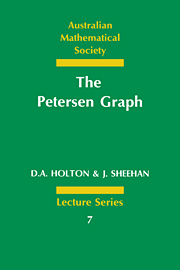2 - The Four Colour Problem
Published online by Cambridge University Press: 13 March 2010
Summary
Prologue
“I wonder why problems about map-colourings are so fascinating? I know several people who have made more or less serious attempts to prove the Four-Colour Theorem, and I suppose many more have made collections of maps in the hope of hitting upon a counter-example. I like P.G. Tait's approach myself; he removed the problem from the plane so that it could be discussed in terms of more general figures. He showed that the Four-Colour Theorem is equivalent to the proposition that if N is a connected cubic graph, without an isthmus, in the plane, then the edges of N can be coloured in three colours so that the colours of the three meeting at any vertex are all different. It was at first conjectured that every cubical graph having no isthmus could be ‘three-coloured’ in this way, but this was disproved by reference to the Petersen graph, for which it may readily be verified that no three-colouring exists.
“I have often tried to find other cubic graphs which cannot be three-coloured. I do think that the right way to attack the Four-Colour Theorem is to classify the exceptions to Tait's Conjecture and see if any correspond to graphs in the plane. I did find some, but they were mere trivial modifications of the Petersen graph, obtained by detaching the three edges meeting at some vertex from one another so that the vertex becomes three vertices, and joining these three by additional edges and vertices so as to obtain another cubic graph. (Figure 0.1 is an example of such a trivial modification.)
- Type
- Chapter
- Information
- The Petersen Graph , pp. 49 - 78Publisher: Cambridge University PressPrint publication year: 1993

